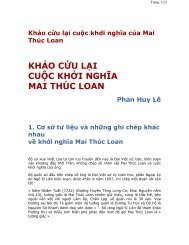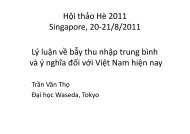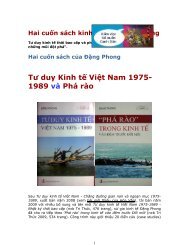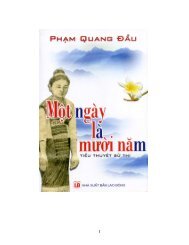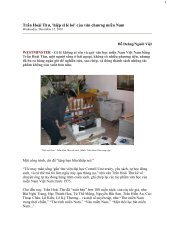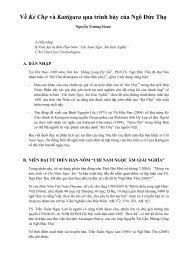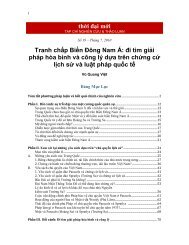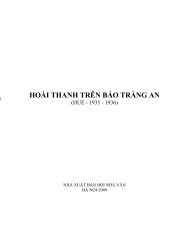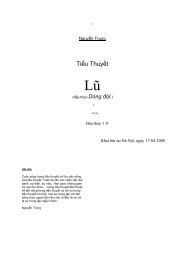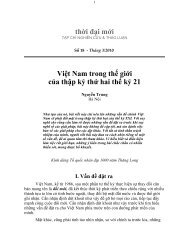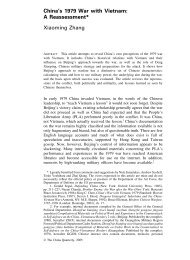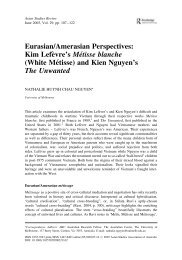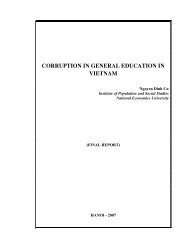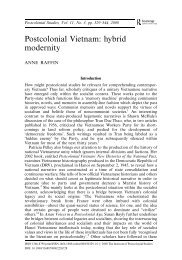John T. McNaughton and Vietnam: The Early Years as ... - Viet-studies
John T. McNaughton and Vietnam: The Early Years as ... - Viet-studies
John T. McNaughton and Vietnam: The Early Years as ... - Viet-studies
Create successful ePaper yourself
Turn your PDF publications into a flip-book with our unique Google optimized e-Paper software.
BENJAMIN T. HARRISON AND CHRISTOPHER L. MOSHER 509<br />
the answer’. 72 At le<strong>as</strong>t he <strong>and</strong> his boss agreed on something. By June<br />
1965, <strong>McNaughton</strong>’s comments on the war revealed his innermost<br />
reservations about American involvement. It is in that month that he<br />
wrote a h<strong>and</strong>-written note which summarized what he described <strong>as</strong> the<br />
‘minuses’ of American involvement in <strong><strong>Viet</strong>nam</strong>. As previously mentioned,<br />
it spelled out brilliantly why he w<strong>as</strong> a dove. Moreover, not only did his<br />
wit st<strong>and</strong> out <strong>as</strong> in so many of his memos but his wording also reflected<br />
the times:<br />
1. Wrong ‘sphere of influence.’<br />
2. Overthrow by force ‘accepted’ where no other means.<br />
3. <strong>The</strong> ‘spirited’ should prevail over the ‘slobs.’<br />
4. <strong>The</strong> ‘peeful’ should prevail over the ‘elite.’<br />
5. <strong>The</strong> country should be unified.<br />
6. Yellow men should settle yellow men’s trouble. 73<br />
He noted that there were no ‘pluses’. <strong><strong>Viet</strong>nam</strong> w<strong>as</strong> not in our ‘sphere of<br />
influence’, the western hemisphere w<strong>as</strong>, <strong>and</strong> even there he had wanted<br />
military aid ended. <strong>The</strong> government in Hanoi may have been established<br />
by force, but that is acceptable because no other means existed for<br />
coming to power in that country given the absence of a fair election. <strong>The</strong><br />
dedication <strong>and</strong> determination of the enemy should prevail over a Saigon<br />
government that did not seem to care if it won or lost. <strong>The</strong> ‘little man’<br />
in <strong><strong>Viet</strong>nam</strong> struggled against the ‘elite’ l<strong>and</strong>lords <strong>and</strong> wealthy colonial<br />
collaborators, <strong>and</strong> deserved victory. He believed no one could argue<br />
against <strong><strong>Viet</strong>nam</strong>ese national unity <strong>and</strong> independence. L<strong>as</strong>t but certainly<br />
not le<strong>as</strong>t, <strong>McNaughton</strong> insisted that the <strong><strong>Viet</strong>nam</strong>ese should settle their<br />
own troubles without any outside power being involved. Few doves have<br />
ever articulated the opposition to the war better, even if the wording w<strong>as</strong><br />
far from politically correct.<br />
In June 1965 <strong>McNaughton</strong> had a conversation with U. Alexis <strong>John</strong>son,<br />
a notable ‘hawk’ who served at various times <strong>as</strong> deputy undersecretary of<br />
political affairs <strong>and</strong> other times <strong>as</strong> deputy amb<strong>as</strong>sador to <strong><strong>Viet</strong>nam</strong>. <strong>The</strong><br />
two used to ‘argue very vigorously’ 74 about <strong><strong>Viet</strong>nam</strong> <strong>and</strong> on this occ<strong>as</strong>ion<br />
<strong>McNaughton</strong> <strong>as</strong>ked <strong>John</strong>son if more American troops in <strong><strong>Viet</strong>nam</strong><br />
would make a positive difference. When the reply w<strong>as</strong> in the negative,<br />
<strong>McNaughton</strong> <strong>as</strong>ked if he thought some current troops should be withdrawn<br />
<strong>and</strong> again the response w<strong>as</strong> negative. At that point, <strong>McNaughton</strong><br />
<strong>as</strong>ked <strong>John</strong>son, ‘What if you are wrong about whether <strong><strong>Viet</strong>nam</strong> h<strong>as</strong> gone<br />
downhill over the l<strong>as</strong>t year, how would that affect your judgment about<br />
deploying more U.S. troops?’ <strong>John</strong>son must have been a little ex<strong>as</strong>perated<br />
<strong>as</strong> he replied once again, ‘It is still doubtful that more U.S. troops would<br />
72 Robert S. McNamara, In Retrospect: <strong>The</strong> Tragedy <strong>and</strong> Lessons of <strong><strong>Viet</strong>nam</strong> (New York: 1995),<br />
p. 183.<br />
73 JTM Papers, Box 1, File IV, #59 LBJL. His son, Alex <strong>McNaughton</strong>, confirmed that this w<strong>as</strong> his<br />
father’s h<strong>and</strong>writing <strong>and</strong> the penmanship matches that of his journal.<br />
74 Oral Interview of Alexis <strong>John</strong>son by Paige Mulhollan, 14 July 1969, LBJL.<br />
© 2007 <strong>The</strong> Authors. Journal compilation © 2007 <strong>The</strong> Historical Association <strong>and</strong> Blackwell Publishing.



